
Pinochle, also called pinocle or penuchle, is a trick-taking, Ace-Ten card game typically for two to four players and played with a 48-card deck. It is derived from the card game bezique; players score points by trick-taking and also by forming combinations of cards into melds. It is thus considered part of a "trick-and-meld" category which also includes the game belote. Each hand is played in three phases: bidding, melds, and tricks. The standard game today is called "partnership auction pinochle".

Bezique or Bésigue is a 19th-century French melding and trick-taking card game for two players. The game is derived from Piquet, possibly via Marriage (Sixty-six) and Briscan, with additional scoring features, notably the peculiar liaison of the Q♠ and J♦ that is also a feature of Pinochle, Binokel, and similarly named games that vary by country.
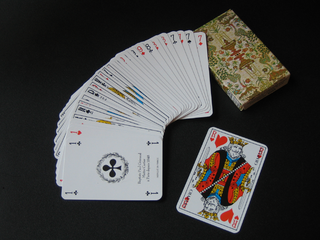
Piquet is an early 16th-century plain-trick card game for two players that became France's national game. David Parlett calls it a "classic game of relatively great antiquity... still one of the most skill-rewarding card games for two" but one which is now only played by "aficionados and connoisseurs."

Polignac is a French 18th century trick-taking card game ancestral to Hearts and Black Maria. It is played by 3-6 players with a 32-card deck. It is sometimes played as a party game with the 52-card pack; however, it is better as a serious game for four, playing all against all. Other names for this game include Quatre Valets and Stay Away. Knaves is a variant and it is also similar to the Austrian and German games, Slobberhannes, Eichelobern and Grasobern.
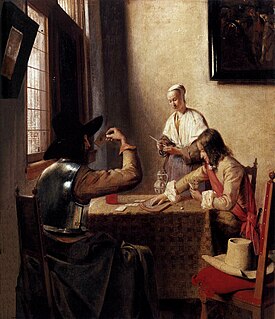
Klaverjas or Klaverjassen is the Dutch name for a four player trick-taking card game using the piquet deck of playing cards. It is closely related to the card game klaberjass, which is popular internationally and also known as Bela, and various other names. It is one of the most popular card games in the Netherlands, traditionally played in cafes and social clubs. The game offers a considerable level of complexity and depth. It has numerous variants, but universal fundamental rules exists.

Sedma is a Czech 4-card trick-and-draw game played by four players in fixed partnerships with a 32-card Bohemian-pattern pack. Card suits do not play a role in this game, and there is no ranking order. A trick is won by the last player to play a card of the same rank as the card led.

Klaberjass or Bela is a trick-taking Ace-Ten card game that is most popular in German communities. In its basic form it is a 9-card trick-and-draw game for two players using a 32-card piquet pack.
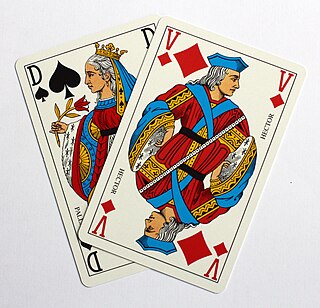
Marjolet is a French 6-card trick-and-draw game for two players using a 32-card piquet pack. It is of the Queen-Jack type, and thus a relative of Bezique and Pinochle, albeit simpler. The trump Jack is called the marjolet from which the name of the game derives.

Mariage or Mariagenspiel is a German 6-card trick-and-draw game for two players in which players score bonus points for the "marriage" of King and Queen of the same suit. The game, first documented in 1715 in Leipzig, spawned numerous offshoots throughout continental Europe and gives its name to the Marriage group of card games, the widest known of which is probably Sixty-Six. Many of these are still the national card games of their respective countries. It is unrelated to the Nepalese game of Marriage.

The Jack–Nine card games, also known as the Jass group, form a family of trick-taking games in which the jack (jass) and nine (manille) of the trump suit are the highest-ranking trumps, and the tens and aces of all suits are the next most valuable cards. Games in this family are typically played by 2 or 4 players with 32 French-suited cards.

Rams is a European trick-taking card game related to Nap and Loo, and may be played by any number of persons not exceeding nine, although five or seven make a good game. In Belgium and France, the game of Rams is also spelt Rammes or Rems, in Germany, Rams, Rammes, Ramsch, Ramschen, Ramscheln or Ramsen, in Austria, Ramsen and Ramschen, and, in America, Rounce. The basic idea is fairly constant, but scoring systems vary. It was a widespread European gambling and drinking game that is still popular today. During the 19th century, it was introduced as Rounce in America and played with a 52-card deck without any difference between simples and doubles and with no General Rounce announcement. In the modern German variety of the game, Ramscheln, the 7♦ is the second best trump ranking next below the ace.

Brusquembille is an historical, French, 3-card trick-and-draw game for two to five players using a 32-card piquet pack. The game has variable trumps. Side-payments are made for keeping or winning aces and tens.
Jeu Royal de la Guerre is a French novelty card game for two to twelve players that was described in La Maison des Jeux Academiques in 1659. It is a trick-taking game played with a dedicated war-themed 40-card pack based on the French-suited 36-card piquet pack. The suits are irrelevant for gameplay, and to a large extent the game is determined by four suitless special cards.
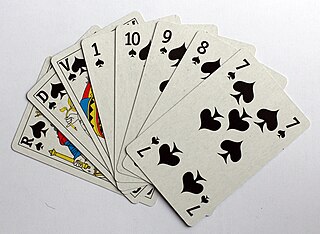
Triomphe, once known as French Ruff, is a card game dating from the late 15th century. It most likely originated in France or Spain and later spread to the rest of Europe. When the game arrived in Italy, it shared a similar name with the pre-existing game and deck known as trionfi; probably resulting in the latter becoming renamed as Tarocchi (tarot). While trionfi has a fifth suit that acts as permanent trumps, triomphe randomly selects one of the existing four suits as trumps. Another common feature of this game is the robbing of the stock. Triomphe became so popular that during the 16th century the earlier game of trionfi was gradually renamed tarocchi, tarot, or tarock. This game is the origin of the English word "trump" and is the ancestor of many trick-taking games like Euchre and Whist.

An Ace-Ten game is a type of card game, highly popular in Europe, in which the Aces and Tens are of particularly high value.
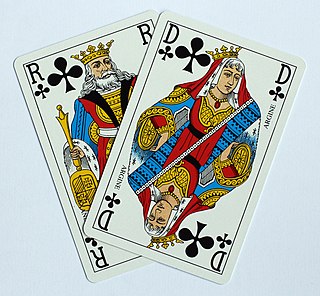
Briscan is an 18th-century, French card game for two players played with a 32-card Piquet pack. It is a member of the Marriage group of games in which the 'marriage' of a King and Queen brings a bonus score, but Briscan takes this simple concept to extraordinary lengths.

Culbas or Cul-bas is an historical French card game of the fishing type for three to eight players that dates to at least the 17th century. It is described as being "very old" and having "a great simplicity in which chance plays the biggest role."

Gé, Point, Flux et Sequence, also called Les Quatre Jeux is an historical, French gambling, card game of the 17th and early 18th centuries.
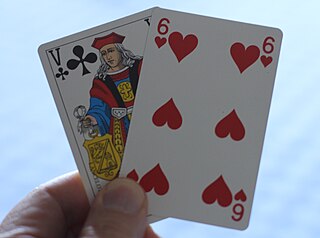
Ferme ("Farm") is an historical French gambling game of the banking type for ten to twelve players that dates to the mid-17th century. It was described then as being "fun and recreational".

Papillon is an old French card game of the fishing type for three or four players. It has been described as "perfect for children who know how to count".


















